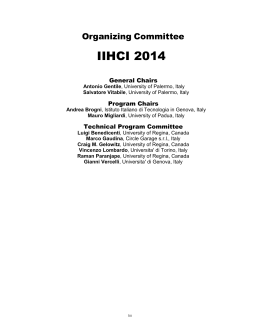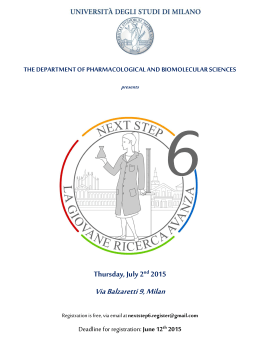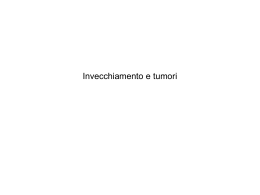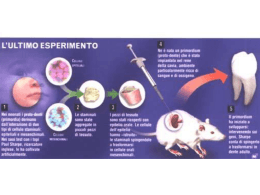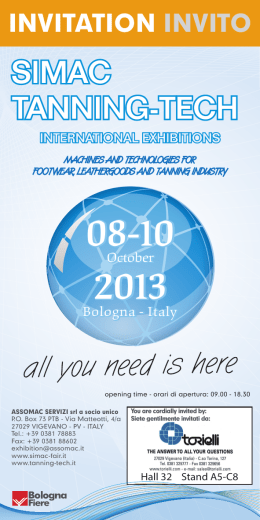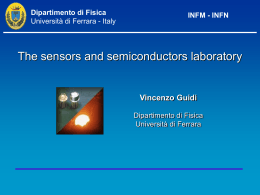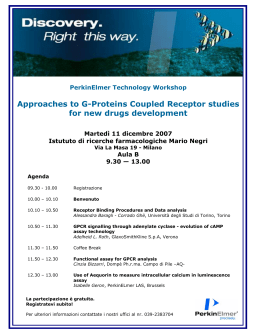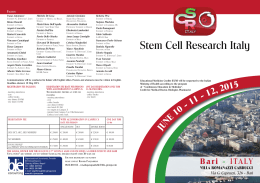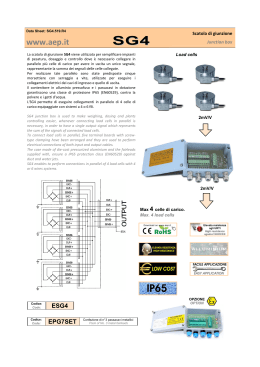THE DEPARTMENT OF PHARMACOLOGICAL AND BIOMOLECULAR SCIENCES presents Tuesday, June 3rd 2014 Via Balzaretti 9, Milan Registration is free, just email at [email protected] Deadline for registration is May 15th 2014 Registration is free, just email at Department of Pharmacological and Biomolecular Sciences (DiSFeB) [email protected] Via Balzaretti 9, Milano Deadline for registration is May 15th 2014 Tuesday, June 3rd 2014 – SCIENTIFIC PROGRAMME 8:00 – 8:45 8:45 – 9:00 Registration Opening Prof. Giorgio Racagni, DiSFeB Director 9:00 – 10.00 Oral presentations, 1st session – Aule A e B Neuroscience Field Cardiovascular Field Chairs: Alessia Luoni, Jennifer Stanic Chairs: Lorenzo Arnaboldi, Laura Castiglioni, Patrizia Amadio 9.00 – 9.15 Simona Melfi GABA-B receptor mediated effects in non-myelinating Schwann cells 9.15 – 9.30 Francesca Guzzetti Encoding synaptic GluN2A-containing NMDA receptor activation: the role of ring finger protein 10 9.30 – 9.45 Juliet Richetto Long term effects of late prenatal immune activation: transcriptome analysis and relevance for psychiatric disorders 9.45 – 10.00 Riccardo Cristofani Inhibition of dynein ATPase activity reduces aggregation of misfolded proteins involved in motoneuron diseases 10.00 – 10.15 Davide Marangon Gene regulation of GPR17, a checkpoint receptor in oligodendroglial differentiation 10.15 – 10.30 Mara Seguini Antidepressant treatments induce different and time-dependent modulation of rat hippocampal miRNome 10:30 – 11.00 11.00 – 12.00 9.00 – 9.15 Cecilia Vitali Role of LCAT in brain lipoproteins metabolism 9.15 – 9.30 Malvina Hoxha A new gateway for rheumatoid arthritis: COXIBs with a safety cardiovascular profile 9.30 – 9.45 Elena Sommariva Does a misregulated lipid metabolism endorse Arrhythmogenic Right Ventricular Dysplasia (ARVD) adipogenic differentiation? Characterization of the lipid profile of cultured cardiac stromal cells from ARVD vs NON-ARVD patients 9.45 – 10.00 Laura Rossetti Prothrombotic phenotype of CAD patients with diabetes: platelet Tissue Factor and thrombin generation 10.00 – 10.15 Giulia Ganzetti ApoA-I depletion in chow-fed ApoE-KO mice severely enhances aortic and coronary atherosclerosis development 10.15 – 10.30 Susanna Fiorelli Human monocyte-derived macrophages are heterogenous: proteomic profile of different morphotypes Coffee break Lecture – Prof. Graziella Messina Department of Biosciences, University of Milan 12.00 – 13.00 13.00 – 14.00 14.00 – 17.00 Round table – «DiSFeB incontra…» Lunch Oral presentations, 2nd and 3rd sessions – Aule A e B Neuroscience Field Nutraceutical Field Chairs: Lucia Caffino, Manuela Mellone Chairs: Chiara Di Lorenzo, Elisa Colombo 14.00 – 14.15 Giuseppe Giannotti Life-long adaptive changes following repeated exposure to cocaine during adolescence: focus on cortical neuroplastic mechanisms 14.15 – 14.30 Luca Castelnovo Nerve regeneration and anti-neuropathic effects exerted by GABA-B ligands 14.30 – 14.45 Silvia Pelucchi CAP2, a regulator of actin filament dynamic, is a novel ADAM10 interactor 14.45 – 15.00 Andrea Rossetti The activation of the immune/inflammatory system is associated with the stressinduced anhedonia in rats: effect of pharmacological intervention 15.00 – 15.15 Giusy Coppolino Fate mapping of the oligodendroglial precursor cells expressing the GPR17 receptor in Experimental Autoimmune Encephalomyelitis, a mouse model of Multiple Sclerosis 15.15 – 15.30 Paolo Tornese Corticosterone application in vitro to synaptosomes mimics the ex vivo effect of stress on the glutamate presynaptic machinery 14.00 – 14.15 Anna Parolari γ-Conglutin, the lupin seed glucose-lowering glycoprotein, interferes on insulin pathway in Hep G2 cells 14.15 – 14.30 Monica Marzagalli Type I GnRH receptor mediates the antitumor effect of GnRH III-bioconjugates on prostate cancer cells 14.30 – 14.45 Rossella Calò Evaluation of Protective effect of thymol against UVA- and UVB-induced damage using an In Vitro (human keratinocytes) and an ex-vivo human skin tissue model 14.45 – 15.00 Marco Fumagalli In vitro anti-inflammatory activity of tannin-enriched extracts from Fragaria spp 15.00 – 15.15 Gianfranco Frigerio Ginkgolides and 4'-O-methylpyridoxine as biological markers of Ginkgo biloba poisoning 15.15 – 15.30 Yuri Manzoni Molecular approaches to evaluate the suitability of oat varieties for gluten-free diet Immunology Field Metabolism Field Chairs: Alessandro Villa, Silvia Franchi Chairs: Sara Della Torre, Gaia Cermenati, Paola Corsetto 15.30 – 15.45 Federica Dellera ApoA-I deficiency in ApoE-KO mice severely alters lymph nodes and modulates Tlymphocyte subsets 15.45 – 16.00 Giovanna Luisa Pepe Genome-wide analysis of estrogen action in macrophages 16.00 – 16.15 Giorgia Calderazzi Study of M2 polarization in mouse brain 16.15 – 16.30 Paola Roderi Repeated intratracheal instillation of PM10 induces lipid reshaping in lung parenchyma and in extra-pulmonary tissues 16.30 – 16.45 Angela Papale Molecular mechanisms involved in chemical allergen-induced IL-18 production in a human keratinocyte cell line 16.45 – 17.00 Elena Bizzotto SIRT1 activity disjoins anti-inflammatory and chemopreventive activity of NSAIDs 17.00 – 17.15 Massimiliano Bissa DNA and fowlpox-based recombinants as a prophylactic/therapeutic vaccine against Human Papillomavirus (HPV)-related cancers 15.30 – 15.45 Alessandra Ferrari Epigenetic regulation of energy metabolism in a model of diet induced obesity: focus on class I HDACs 15.45 – 16.00 Erika Fiorino Histone deacetylases (HDACs) and cholesterol catabolism: effect of HDAC7 deletion on lipid and lipoprotein profile 16.00 – 16.15 Roberta Fontana Hepatic estrogen receptor activity and metabolic disorders 16.15 – 16.30 Simone Romano Effects of diabetes on brain structures 16.30 – 16.45 Matteo Audano Zc3h10 orchestrates C2C12 skeletal muscle cells differentiation 16.45 – 17.00 Chiara Macchi Could iron overload affect the reproductive axis? Evidence from in vitro and in vivo models 17.00 – 17.15 Stefania Moretti Signaling pathways responsible for the regulation of the glutamate transporter 1 (GLT1/EEAT2) in pancreatic beta cells 17:30 – 18.00 18.00 Closing remarks and prizes for best oral presentations Happy Hour
Scaricare
